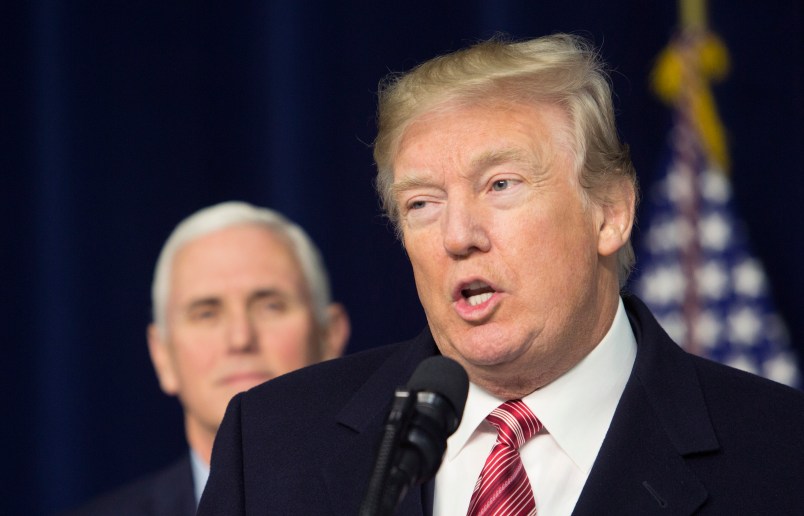President Trump’s campaign committee is fundraising off a controversial request from his Justice Department that the 2020 Census include a question about citizenship.
An email from the campaign committee poses a survey to recipients with the subject line “a truly simple question for you.”
“The President wants the 2020 United States Census to ask people whether or not they are citizens,” the email said. “In another era, this would be COMMON SENSE… but 19 attorneys general said they will fight the President if he dares to ask people if they are citizens. The President wants to know if you’re on his side.”
The email then includes a survey on the question that leads to page seeking contributions to the campaign.

Former Census officials, policy wonks and civil rights advocates have all come out against the idea of asking about citizenship status in the decennial census. They fear that it will depress participation — especially among minority and immigrant communities. Internal Census research has shown that the question prompts fears about confidentiality and privacy among survey takers. Even citizens who live with non-citizens might be fearful about participating if the question is included, particularly given the anti-immigrant rhetoric coming out of the Trump administration, critics of the idea say.
An undercounting of urban and minority communities stands to shift political power and resources to rural and white communities.
Critics also say adding the question this late in Census planning period adds another practical complication for a Census already facing a number of logistical hurdles.
ProPublica reported recently that John Gore, a political appointee at the Justice Department who previously represented Republicans in high-profile voting rights lawsuits, was behind the request that Census Bureau consider adding the question. An aide to a former Republican senator who championed a bill to include the citizenship question has recently joined the Census as a political appointee, ProPublica also reported.
Commerce Secretary Wilbur Ross, who will have the final say over whether the question is included, is required to submit to Congress the questions Census intends to ask by the end of the month.







Dear GOP: have you no sense of decency, at long last, have you no sense of decency
(This is, of course, a rhetorical question - the answer is obviously no, they have none)
Well, if the question is included, I know what my answer is going to be. In fact, it wouldn’t surprise me if the number of non-citizens counted in this country suddenly skyrocketed.
Why make it tougher on Melania? I mean Mrs. “Einstein” Trump…
Gee, and here I thought the Census was all about counting the populace of the United States, not checking peoples’ papers. Silly me.
It is about counting the populace. That’s why the Republicans want to make non-citizens (especially those without papers) to respond to the census at all. As the story points out, they tend to reside disproportionately in large urban areas, and since Congressional representation is apportioned not on the number of actual citizens in a state, but the total number of residents of all statuses, if the non-citizen responders can be suppressed, then cities will lose representation in comparison to rural areas, which are already over-represented in the House thanks to gerrymandering and to the fact that states with small populations have more congressional reps per thousand residents than those with larger populations.
(For example, Wyoming, with a 2017 population of 579,315, has one representative in Congress. California, with a 2017 population of 39,536,653, has 53 representatives in Congress, or one per 745,974 people. If California had representatives in the same proportion that Wyoming has, they would have 68 representatives, or 15 more than they are currently allotted.)
The fight it about how the populace is counted. The last time the census was taken, there was a lot of discussion about using modern statistical analysis to adjust the raw counts to correct for the inevitable errors and biases that are introduced by a manual count, and which would help with populations (like homeless people) who tend to be badly undercounted and give, actually, a more accurate count. The Republicans wouldn’t hear of it.
Census population counts are also used in a lot of allocation formulas for federal funds, so in addition to having their fair share of Congressional representation diminished, states with proportionately high non-citizen residents would also have their fair share of many federal grants diminished if the census includes a question that would tend to suppress (by way of intimidation) participation by non-citizen populations.